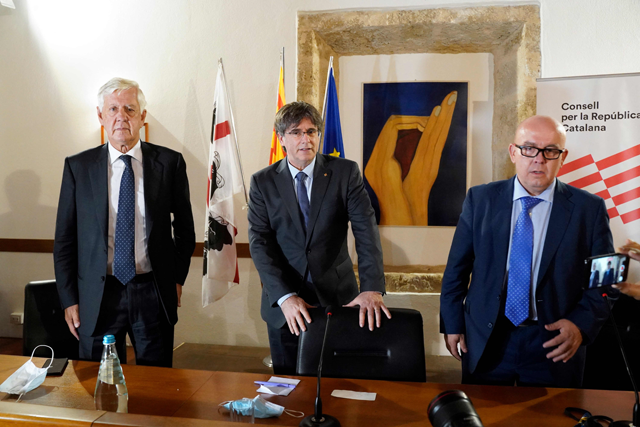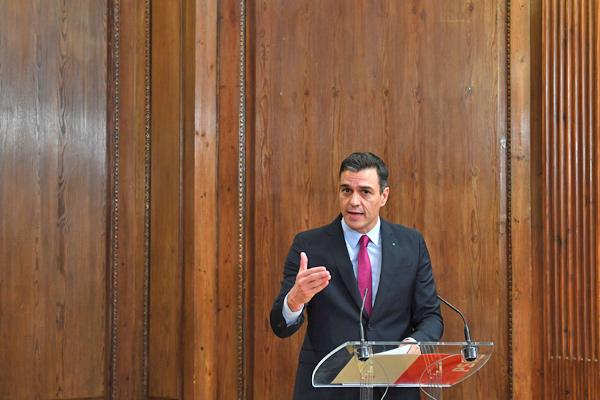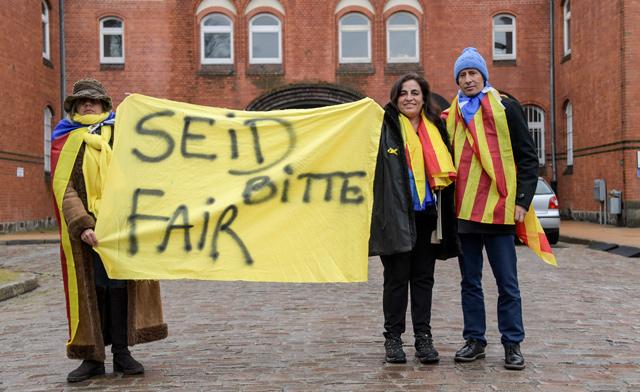You are here
Spain drops sedition charge against ex-Catalan leader
By AFP - Jan 12,2023 - Last updated at Jan 12,2023

In this file photo taken on October 4, 2021, Catalonia's exiled former leader Carles Puigdemont (centre) flanked by his Italian lawyer Agostinangelo Marras (left) and his Spanish lawyer Gonzalo Boye, prepares to address the media during a press conference in Alghero, Sardinia, Italy, after his extradition hearing (AFP photo)
BARCELONA — The Spanish supreme court on Thursday dropped sedition charges against former Catalan leader Carles Puigdemont over a failed 2017 independence bid that sparked Spain's worst political crisis in decades.
But the court maintained lesser charges of misuse of public funds and disobedience against Puigdemont, who lives in self-imposed exile in Belgium to avoid prosecution in Spain and holds a seat in the European Parliament.
The move follows a reform of Spain's criminal code in December that abolished the offence of sedition and replaced it with the charge of public disorder that carries softer penalties.
The reform — which was fiercely opposed by the right-wing opposition Popular Party (PP) — also lowered the penalty for misuse of public funds.
Both offences were used against Catalan leaders who staged a 2017 independence referendum deemed illegal by the courts, followed by a unilateral declaration of independence for the wealthy northeast region.
Puigdemont, who headed the Catalan government at the time of the independence push, now potentially faces a shorter prison term if he is convicted than was the case before the sedition charge was dropped.
The supreme court in 2019 sentenced former Catalan vice president Oriol Junqueras to 13 years behind bars for sedition and misuse of public funds for his role in the separatist push.
Since taking power in June 2018, Socialist Prime Minister Pedro Sanchez has sought to defuse the conflict in Catalonia.
In 2021, he pardoned Junqueras and eight other Catalan separatist leaders who were convicted over their roles in the separatist push.
Analysts say the criminal code reform, which came into effect on Thursday, is part of an attempt to win support in vote-rich Catalonia ahead of Spain's general election expected later this year.
It is also seen as a bid to assure Catalan pro-independence party ERC continues to support Sanchez's minority government in tight parliamentary votes.
'Red carpet'
The main opposition PP has denounced the reform as "tailor-made for convicts". Some of Sanchez's own Socialists have also been critical.
Top PP official Elias Bendodo on Thursday accused Sanchez of having paved the way for Puigdemont to return to Spain "on a red carpet".
But the government's main spokesperson, Isabel Rodriguez, defended the criminal code reform, saying it brought Spanish law in line with its European peers.
She said there are "tools to pursue" the events of the failed independence bid which "continue to have a criminal sanction", she told reporters.
Puigdemont and a number of his separatist colleagues fled to Belgium in October 2017, fearing arrest after the failed independence bid. He became a member of the European Parliament in June 2019.
Supreme court judge Pablo Llarena said on Thursday he would submit a new extradition request to Belgian authorities for Puigdemont to face trial on the lesser charges, pending EU courts' rulings on whether Puigdemont has immunity as a European lawmaker.
Belgium has so far denied Spain's extradition request for Puigdemont, and it was not clear how having the charge of sedition dropped would affect the chances of him being sent back by Belgian officials.
Puigdemont's lawyer, Gonzalo Boye, told Catalan radio he was "convinced" his client would soon be able to return to Spain, adding he expected European courts would confirm he has immunity at the end of February or in March.
Related Articles
MADRID — A Spanish judge who is investigating ousted Catalan president Carles Puigdemont and his fallen government has expanded the probe to
BARCELONA — A Catalan separatist party is expected on Thursday to back the investiture of Spain's Socialist leader Pedro Sanchez for another
BERLIN — German prosecutors filed a request to a regional court on Tuesday for the extradition of former Catalan president Carles Puigdemont



















